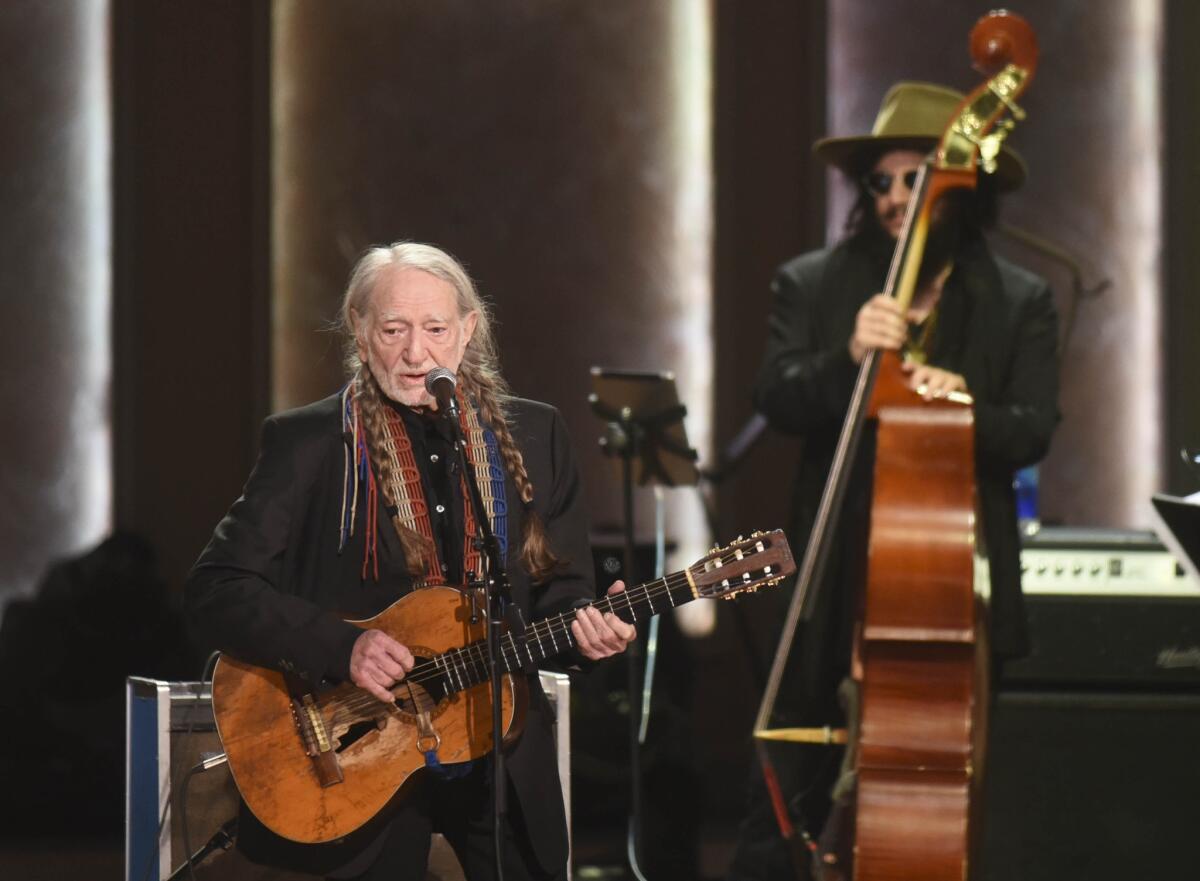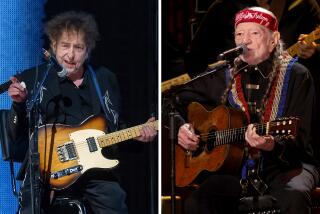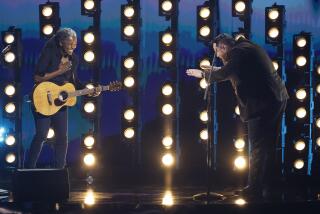Neil Young and Paul Simon join in Gershwin Prize tribute to Willie Nelson

Willie Nelson performs after receiving the 2015 Library of Congress Gershwin Prize on Nov. 18, 2015, in Washington.
Willie Nelson’s duet with Cyndi Lauper during Wednesday night’s Gershwin Prize tribute was not the best moment in the show, but it perfectly encapsulated why Nelson was being honored by the Library of Congress as a standard-bearer for American song.
Nelson and Lauper — the Red Headed Stranger and the pink-haired chanteuse — sang “Let’s Call the Whole Thing Off,” the Gershwin standard that will be part of Nelson’s next album, which happens to be a collection of songs by George and Ira Gershwin.
SIGN UP for the free Essential Arts & Culture newsletter >>
It was a reminder that Nelson has never seen a distinction among genres. Show tunes, country, jazz, rhythm and blues, folk, rock ... Nelson has even made a reggae album. (Look it up. Or don’t.) It’s not always magic, but it’s never dishonest.
“I wouldn’t call him country or soul or exclusively anything,” Kris Kristofferson said in one of several video tributes. “He’s one of a kind.”
The Lauper duet showed that at 82 years old, Nelson retains full control of his distinctive pacing and that his voice remains strong and comforting, even if it crackles a bit.
Wednesday’s concert was one among a series of lifetime honors bestowed on Nelson, not only for his versatility as a performer, but also for his status as a great American songwriter, a philanthropist who has helped raise $50 million through Farm Aid, and a cultural icon who has appeared in everything from an “Austin Powers” movie to a Super Bowl commercial, most often as himself.
The concert that will be broadcast on PBS stations on Jan. 15 was another illustration of his stature, and the versatility of his best songs. Neil Young opened with a feedback-drenched version of “Whiskey River,” and Raul Malo, the Cuban American country singer for the Mavericks, sang “Crazy” in a soothing baritone reminiscent of Roy Orbison. Ana Gabriel sang “I Never Cared for You” in Spanish.
Paul Simon and Edie Brickell performed a romantic campfire version of “Remember Me.” Simon also teamed with Buckwheat Zydeco for a jaunty rendition of “Man with the Blues.”
Many of the performances transcended, particularly Alison Krauss singing “Angel Flying Too Close to the Ground,” rendered as the seductive torch song it was meant to be. Rosanne Cash singing “Poncho and Lefty,” one of the few Nelson classics that he didn’t write, and Leon Bridges singing “Funny How Time Slips Away” were also highlights.
The Library of Congress started the award in 2007 and has so far given it to Simon, Billy Joel, Stevie Wonder, Carole King, Paul McCartney and the team of Burt Bacharach and Hal David. It’s an opportunity to raise the library’s image and curry favor with its benefactors, including several members of Congress who sat in the audience at the DAR Constitution Hall, just around the corner from the White House.
There was nothing overtly political in the performances. But one could not help but notice that soon after accepting the prize, Nelson and his sons Lucas and Micah performed a song that could be read as an embrace of refugees whose fates were being debated in Congress. In introducing the 1986 track “Living in the Promiseland” (written by David Lynn Jones), Nelson said it was one of the most appropriate songs he could perform for this period on Earth.
Give us your tired and weak
And we will make them strong.
Bring us your foreign songs
And we will sing along.
Leave us your broken dreams
We’ll give them time to mend.
There’s still a lot of love
Living in the Promiseland …
After Nelson delivered the last lyric, “And room for everyone. Living in the Promiseland,” the bipartisan crowd gave him a standing ovation.
More to Read
The biggest entertainment stories
Get our big stories about Hollywood, film, television, music, arts, culture and more right in your inbox as soon as they publish.
You may occasionally receive promotional content from the Los Angeles Times.







